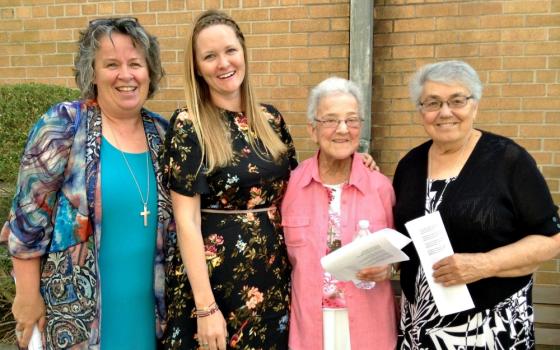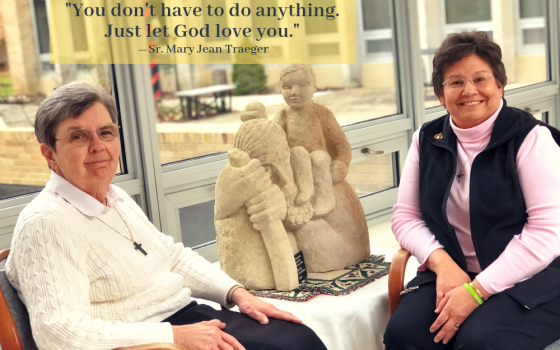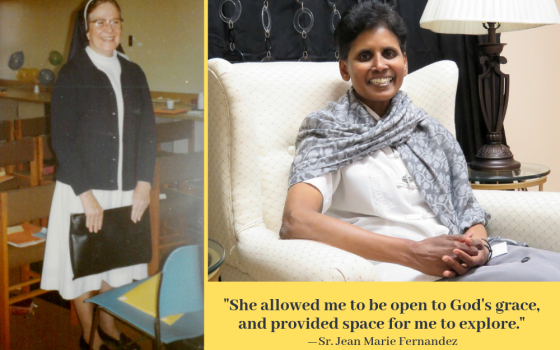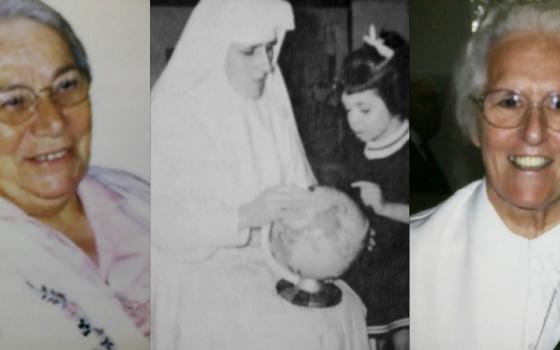On the surface, their life stories seem radically different.
One was engaged to be married, another an engineering professor with a secret theology habit. A third, who had come to America to attend college, was thousands of miles away from the familiarity of home and family.
But what these, and the other women interviewed for this story, have in common was a connection with another woman, one that altered the trajectory of their lives — someone who sparked a desire for religious life they might not have known existed.
No one profiled mentioned being on the receiving end of a direct question like: "Have you ever thought about signing on with us?"
"For many of the people I talk with, it's not 'Oh, I want to be her,'" says Libby Osgood, a novice with the Congregation of Notre Dame. Instead, she says, it's a matter of a sister inquiring, "But what about you?" It's a question that's only possible if a relationship is already there.
These stories of inspiration include those of several sisters whose mentors have died. Some of the women mentored are just launched in religious life, but others are veterans whose memories of friendship and support from an already-established sister stretch back decades.
Sarah Hennessey and Cecilia Corcoran
Franciscan Sisters of Perpetual Adoration
Sarah Hennessey was 21 when she met Franciscan Sr. Cecilia Corcoran while attending a cultural immersion program in Mexico more than 20 years ago. It didn't take them long to strike up an intense conversation, recalls Hennessey now.
"About a day into the program she asked me, 'Did you ever think God might have a call on your life?' I didn't know what she was talking about," admitted Hennessey, "but I was really interested, and it lit a little fire in my heart."
For her part, Corcoran, one of the leaders of the ecumenical program, was impressed by Hennessey's commitment to learning Spanish, understanding the local culture and her "Franciscan" spirit. Raised in the Quaker tradition, Hennessey, who says her faith was very important to her, was a religion major at Guilford, a Quaker college.
"She exudes a peaceful presence and an obvious commitment to live a simple life in the spirit of the Quakers," remembers Corcoran, who wrote Hennessey after the young woman had returned to the United States, encouraging her to pursue her spiritual exploration.
The letters were moving, says Hennessey, who has gone back and read them again. The young woman peppered the older one with questions about religious life: What did it mean to her family when Corcoran entered? What did sisters do? What did she like or not like about the life?
But she remembered what Corcoran had told her in those initial conversations: "You can't say yes to a religious life until you can say no to it. It must be a free choice."
"Ceci became a friend to me, but she also walked me through my doubts," says Hennessey. Though she visited the sisters in LaCrosse, Wisconsin, and felt immediately at home, she remembers, she went about the discernment process "fully and deliberately."
After becoming Catholic in 2000, she entered the community in 2002. She is now the coordinator at the St. Rose Convent motherhouse. In her role as the person who oversees the cycle of prayer in the chapel staffed 24/7, Hennessey receives around 500 prayer requests and questions weekly — all of which she tries to answer.
Corcoran, now a caretaker for her sister who suffers from dementia, doesn't really understand why she affected Hennessey so deeply — as she has other women. "I have walked with others through discernment," she says. Though some didn't ultimately choose to join a religious community, she calls them "marvelous" and says they are still her friends. "It's a beautiful relationship with which Sarah and I have been blessed."
Says Hennessey, "She helped me discern what this call was all about. She's been there from the beginning."
Libby Osgood and Susan Kidd
Sisters of the Congregation of Notre Dame
In the fireside conversation outside a rugged cabin where they were camping with a group of friends on Canada's remote Cape Breton Island, Libby Osgood, a then 33-year-old University of Prince Edward Island professor, made a confession to her college chaplain colleague. Osgood said she was an engineer and a Catholic who read theology in secret — and she couldn't figure out how to reconcile the two.
As Osgood remembers it now, her friend Susan Kidd, a member of the Congregation of Notre Dame, responded that it was possible to be both an engineer and Catholic: Her entire life was a ministry.
"Then she said something that would be forever etched on my brain," says Osgood: "Do you know what we do?"
In September of the Year of Consecrated Life, Osgood approached Kidd. "Give me your spiel," she told her.
The next day, she contacted the sisters at the Congregation of Notre Dame. "I had no idea it would be a yearlong application process," she says now. "I'm still waiting for everyone else to catch up," she said wryly, referring to the sisters guiding the vocation process.
Osgood's career path does seem to suggest a talented woman in a hurry. As a child who built rockets with her U.S. Air Force father for fun, it seemed "inevitable," she says, that she would pursue a career in the sciences. A bachelor's in science was quickly followed by a master's and then a doctorate in mechanical engineering. She's already got two NASA contracts under her belt. "There are two satellites up there I worked on." She had already taught at the University of Prince Edward Island in Charlottetown for seven years and is currently on leave.
She quickly realized that becoming a sister was more than showing up at the convent door and asking to be let in, she says now. "You and the congregation have to find out if this is a life-giving path. That's not what I wanted to hear."
When she was frustrated with the pace of the process, Kidd offered a safe place to express herself. "Sister Sue was so encouraging. She let me complain. I can honestly say it would have been very difficult without her."
In August 2016, she moved to New York City to join the novitiate. (In this Canadian Broadcasting Corporation story, the NASA engineer says she took her hot pink heels with her.) It was to be a period of exploration that also includes being sent out on missions in other cities where the sisters have a presence. If all goes well, she told herself, she will make her first vows in August 2019.
Without Kidd's "intercession, the opening up of that the door, it might have taken me a lot longer to get there," she says.
Kidd, who spent eight years as a vocation director for her order, says that while she doesn't portray herself as a guide or a role model, she is happy with her calling — and it shows. "Women pick that up. Mentorship is a byproduct of my own vocation story," she says, noting that women on the Prince Edward Island campus have approached her with questions about her life.
Osgood's journey toward religious life was "something that had been there for a while," says Kidd. "I just shook it loose."
Elyse Marie Ramirez and Mary Jean Traeger
Dominican Sisters of Springfield, Illinois
"You know I love him and want to have children, but I want to be a sister," said the 25-year-old woman to her friend, a Dominican sister she had met in the charismatic prayer group they both attended in Springfield, Illinois. "What am I going to do?"
"You don't have to do anything," advised Mary Jean Traeger. "Just let God love you."
Eventually, Elyse Marie Ramirez, who had become a regular when the sisters met at their motherhouse for prayer, gathered up the courage to tell her fiancé that she needed to test the strength of her vocation with the Dominicans.
"I told him I loved him and if I had anybody's children it would be his," she remembers. "He took my hands and held them really tight and said, 'You're going to be a sister. I knew your heart was too big for one person.' "
In August 1982, Ramirez entered the Dominican community in Springfield.
In challenging situations she encountered while adjusting to living in a multigenerational community, she recalls, Traeger, who is 13 years older, "didn't give me answers, but led me in the right direction."
"I didn't think of myself in a formal mentoring role," says Traeger. "She saw me as someone she could trust, especially if she had questions about faith." Traeger, who entered the community in the early 1960s, did so after attending high school run by the Dominican sisters. "I had a whole host of mentors," she remembers.
"Sister Mary Jean helped me know that we have what we need and that we can invite each other to something deeper," says Ramirez, who says she continues to learn from the older sister.
Kelly Moline and M. Loyola Miller
Dominican Sisters of Springfield, Illinois
When Kelly Moline moved to Springfield, Illinois, in 2008 to take a job in nursing home administration, she looked around for a young adult ministry group so that she could stay connected to her Catholic faith roots. It was in that group, which met in the chapel of Benedictine University, that she met Dominican Sr. M. Loyola Miller.
"She was always there, welcoming, friendly," says Moline. As they started to know each other better, Miller invited Moline to attend Mass and breakfast at the motherhouse.
Like Traeger, Miller, who got to know the sisters while attending a small rural Catholic high school in Odell, Illinois, joined the order right after she graduated. "For young women to make that decision in 1964 wasn't all that unusual." Young people currently have a whole menu of opportunities, she says, and their relationship to the church is also different.
Though she had been asked to help with vocation ministry for her community, Miller, like other sisters interviewed, doesn't seem to be a fan of the hard sell. "It's not like I came out and asked her if she'd ever considered religious life. I didn't pursue it. I was going to develop a relationship with her. If something transpired, that was fine."
But as time went by, Moline became convinced she was being called to join Miller's community.
"She was my connection to the charism of joy in the Dominican Sisters of Springfield," says Moline. After hearing Miller give a talk at a Cursillo weekend, "I decided to tell God 'no' no longer."
Now a pastoral care associate at St. Dominic Hospital in Jackson, Mississippi, Moline says that though they are no longer living in the same place, Miller is still an "active prayer presence. A card will come at just the right time."
The way Miller sees it, Moline recognized something about her that made her feel comfortable and accepted. "That's the role I've had with different people in my life: to be a kind of presence. When I realize that," says Miller, "I'm surprised and say, 'I didn't do anything. They say, 'Yes, you did.' "
Jean Marie Fernandez and the late Jeanne Waddell
Sisters of the Good Shepherd
When Jean Marie Fernandez moved to the United States 35 years ago to study for her bachelor of arts, she already knew some Good Shepherd sisters. The international order had a mission in Singapore, where she had grown up.
As she got involved in Catholic campus ministry at the University of San Francisco, she met another Good Shepherd sister, who invited her to visit their community for a weekend retreat.
There, she met Sr. Jeanne Waddell. The memory of that first encounter is still strong after all these years. "She was standing at the front door and she said, 'I wish you would come back to us. I would love to see you here anytime.' "
When she returned to campus, Fernandez, thousands of miles from home, thought, "Wow, that sister really wants me to be there. I matter to her."
Fernandez began to visit the Good Shepherd community on a regular basis. When eventually she made the decision to join, Waddell was not only her mentor in her role as a formation director for novices, but an important guide in adjusting to American life, including encouraging her to get her driver's license, says Fernandez.
In later years, when Waddell had decided to move to St. Louis after retirement, "I would ask her to share with me her wisdom," she says. "Jeanne would tell me about St. John of the Cross and St. Teresa of Avila. I didn't understand one word, but I would listen."
"I get it now," she says.
At the end of Waddell's life, Fernandez was in San Francisco, where she is currently vocation director. When she called the sisters in St. Louis to ask if she should fly out that night, they advised her not to make the trip that day. Early the next morning, she awoke to hear Waddell's voice in her head, saying, "Dying, dying."
After keeping a prayerful vigil in the convent chapel, Fernandez was finally able to reach St. Louis by phone. Waddell, she learned, had died that morning.
Waddell's nurturing care helped Fernandez grow spiritually, she recalls now. "Having met someone on a spiritual plane, she gave me great hope to continue to deepen God's call in my life."
"She allowed me to be open to God's grace, and provided space for me to explore. I watched and listened and learned from her," says Fernandez. "We all need spiritual guides, soul partners and mentors. She was my partner."
Influencers for a new generation
Decades ago, when their numbers were greater, Catholic sisters had prominent roles staffing institutions like churches, parochial schools and hospitals.
Emilie Duchaney, now 81, has been a sister of the Franciscan Missionaries of Mary for 62 years, and she recalls the pre-Vatican II era, when her order was semicloistered and wore the distinctive garb of the time.
When she encountered them for the first time, she was a high school sophomore volunteer in a Boston-based hospital where they had a mission to medically frail children. Her role model, Caterina Isonni, "radiated love and understanding. She taught me a lot," recalls Duchaney, who learned the basics, like how to fold blankets, from the older woman.
Particularly vivid in her mind is an instance where she was about to donate a very worn shirt to charity, but Isonni admonished her: "The poor already have rags. We have to give them something better."
Ellen Dauwer, a Sister of Charity of St. Elizabeth of Convent Station, New Jersey, entered her community after she graduated from college four decades ago — and lived next door to the K-12 parochial school where she and other sisters taught. While she says she sometimes felt as though she were living with her high school teachers, she was grateful for their professional expertise and what she learned by observing them.
Future relationships between sisters and inquirers may look different.
Debbie Borneman, who directs member relationships and services for the National Religious Vocation Conference, says that nowadays relationships among religious are more egalitarian.
"Whereas mentoring is a process of a wisdom figure imparting lived experience and insights with someone who is new, just beginning a journey; accompaniment is when two people interact with each other knowing that each has something to learn from each other's lived experiences. So, at one time, our older members shared their experiences with us in a way that the relationship was vertical. We looked up to our mentors, longing to walk in their footsteps," Borneman, a member of Sisters of Sts. Cyril and Methodius, wrote in an email.
"Now, we recognize the relationship has to be horizontal, where we walk together, shoulder to shoulder, to learn together to live the vows."
Cultural and generational changes have highlighted other differences, says Elaine Davia, who directs the formation ministry for her order, the Sisters of Bon Secours. "My experience is that the most difficult thing is the community aspect. People are living by themselves now."
Younger aspirants, "born with an iPhone in their hand," need to know that it's not appropriate to bring it to the dinner table or a community meeting. Young women ask her whether sisters can wear bright red nail polish or bring a homeless family back to the house with them.
Instead of having one-on-one interactions, she finds that her aspirants prefer group activities, she says. "I find myself having [events] and inviting other sisters to be a part of them," says Davia. But she notes that, even today, almost everyone who pursues religious life has had initial contact with an individual sister.
Having promised herself that she'd never tell anyone that "we never did it that way," Davia says that when it comes to guiding women entering religious life, "I'm always open to new possibilities in keeping with our charism and our mission."
[Elizabeth Eisenstadt Evans is a religion columnist for Lancaster Newspapers Inc., as well as a freelance writer on the religion beat.]







